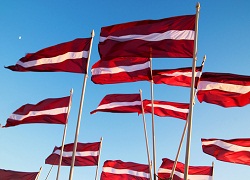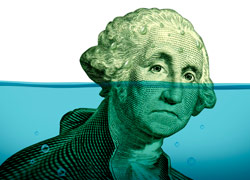 As global markets closed for the year the DJIA finally broke through the critical psyche level of 16,500 to close at 16576. For ‘indices traders’ 2013 has provided spectacular results and very smooth swing-trends throughout the year, due in no small part to the continued QE programme that the Fed only began to taper from December 18th. And that taper failed to arrest the unrelenting bullish advance, leaving analysts and market commentators under no doubt that 2014 will see more of the same, unless an outlier unforeseen event suddenly hits the global markets. The only reasonable barrier to stock market growth in 2014, that most analysts are agreed on, would be an exponential rise in the cost of USA debt.
As global markets closed for the year the DJIA finally broke through the critical psyche level of 16,500 to close at 16576. For ‘indices traders’ 2013 has provided spectacular results and very smooth swing-trends throughout the year, due in no small part to the continued QE programme that the Fed only began to taper from December 18th. And that taper failed to arrest the unrelenting bullish advance, leaving analysts and market commentators under no doubt that 2014 will see more of the same, unless an outlier unforeseen event suddenly hits the global markets. The only reasonable barrier to stock market growth in 2014, that most analysts are agreed on, would be an exponential rise in the cost of USA debt.
At midnight on December 31st an 18th member country finally joins the Eurozone. Latvia is replacing its lats currency for the euro, officially taking the number of Europeans using the single currency to 333 million. Latvia will become the 18th member of the euro area despite opponents of the currency switch outnumbering the proponents as public expectations for accelerating inflation, due to integration begin to mount, according to various opinion polls.
Latvia facts
- Latvia has a population of 2,041,763, after it joins the Eurozone 333 million Europeans will share the same currency.
- Latvia’s old currency, the lats (LVL), can be exchanged as of 1st January at an official conversion rate of 1 euro = 0.702804 LVL. Prices must be displayed both in lats and euros until 30 June 2014.
- GDP growth in third quarter: 1.2% on the quarter (Eurozone: 0.1%, EU: 0.2%, UK: 0.8%)
- GDP per capita, expressed in purchasing power standards is 36% below the EU average, putting Latvia ahead of Croatia, Romania and Bulgaria, but below the rest of the EU.
- Unemployment rate: 11.9% in October (Eurozone: 12.1%, EU: 10.9%, UK: 7.4%)
- Annual consumer price inflation: -0.3% (Eurozone: 0.9%)
Greece takes the EU reins
The New Year heralds an important period for Greece, it takes over the rotating presidency of the European Union. The responsibility comes versus the backdrop of Greek antipathy towards Germany and mounting hostility towards the EU generally.
U.S. Consumer Confidence Rebounds in December
The Conference Board Consumer Confidence Index, which had decreased in November, rebounded in December. The Index now stands at 78.1 (1985=100), up from 72.0 in November. The Present Situation Index increased to 76.2 from 73.5. The Expectations Index increased to 79.4 from 71.1 last month. The monthly Consumer Confidence Survey, based on a probability-design random sample, is conducted for The Conference Board by Nielsen, a leading global provider of information and analytics around what consumers buy and watch. The cut-off date for the preliminary results was December 17th.
Chicago Business Barometer down 3.9 to 59.1 in December
The December Chicago Business Barometer softened to 59.1 from 63.0 in November, the second consecutive monthly decline following October’s surge to 65.9, the highest since March 2011. The moderation in December was led by a second month of slippage in New Orders and declines in four of the five components that comprise the Barometer. In spite of December’s slowdown, the Barometer continued to point to reasonably firm growth and the three month average rose to the highest since May 2011.
Home Prices in 20 U.S. Cities Increase by Most in Seven Years
Home prices in 20 U.S. cities rose in October from a year ago by the most in more than seven years, signalling the real-estate rebound will keep bolstering household wealth in 2014. The S&P/Case-Shiller index of property prices in 20 cities climbed 13.6 percent from October 2012, the biggest 12-month gain since February 2006, after a 13.3 percent increase in the year ended in September, a report from the group showed today in New York.
Market overview at 10:00 PM UK time
The DJIA finally broke through the critical 16500 handle to finish up 0.44% on the day. The SPX closed up 0.40% and the NASDAQ up 0.54%. Euro STOXX closed up 0.26%, CAC up 0.47%, DAX down 0.39% and the UK FTSE up 0.26%.
NYMEX WTI oil closed down 1.01% on the day at $98.29 per barrel, with NYMEX nat gas slumping by 4.27% at $4.24 per therm. COMEX gold closed down 0.12% at $1202.30 per ounce with silver down 1.30% at $19.36 per ounce.
Bullion futures
Bullion futures for February delivery fell 0.1 percent to settle at $1,202.30 an ounce late on the Comex in New York, after touching $1,181.40, the lowest since June 28th. Prices have fallen by 28 percent this year. Investors lost faith in the metal as a store of value as equities rallied and an economic recovery prompted the Federal Reserve to reduce its $85 billion in monthly bond purchases. Silver has dropped 36 percent in 2013 to $19.37 an ounce, the biggest annual drop since 1981.
Forex focus
The euro slipped 0.2 percent to $1.3776 mid-afternoon New York time Tuesday, after climbing to a two-year high of $1.3893 on Dec. 27th. The common currency fell 0.1 percent to 145 yen. Japan’s currency dropped 0.1 percent to 105.26 per dollar, extending its drop this year to 17.6 percent. The euro fell for the first time in five days versus the dollar amid bets the region’s economy will trail that of the U.S., spurring the European Central Bank to keep interest rates low as the Federal Reserve slows stimulus.
The Dollar Spot Index was little changed at 1,020.40. The gauge, which tracks the greenback against 10 major counterparts, has risen 3.5 percent this year, the most since an 8.9 percent advance in 2008. The yen has fallen 16.7 percent in 2013 against a basket of nine other developed-nation currencies tracked by Bloomberg’s Correlation-Weighted Indices, the biggest slide within the gauge, as the Bank of Japan implemented unprecedented stimulus to support Prime Minister Shinzo Abe’s economic strategy.
The pound has gained versus most of its 16 major counterparts this year amid speculation strength in the housing market will support the U.K.’s economic recovery. The pound appreciated 0.6 percent to 83.15 pence per euro after advancing to 83.10 pence, the strongest since Dec. 5th. Sterling gained 0.4 percent to $1.6568.
Bonds
The 10-year yield climbed six basis points, or 0.06 percentage point, to 3.03 percent mid-afternoon New York. It was the highest level since July 2011. The price of the benchmark 2.75 percent security due in November 2023 dropped 15/32, or $4.69 per $1,000 face amount, to 97 5/8. Treasuries fell, pushing 10-year note yields to the highest level in more than two years, as gains in U.S. consumer confidence and home sales bolstered bets the Federal Reserve will end bond purchases next year. Treasuries are poised for the first annual loss since 2009 amid signs the recovery of the world’s biggest economy will prove resilient as the Fed tapers asset-buying.




